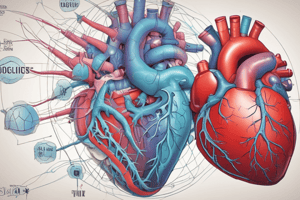Podcast
Questions and Answers
Which of the following medications is not recommended as a first-line treatment for heart failure?
Which of the following medications is not recommended as a first-line treatment for heart failure?
- Angiotensin receptor blockers
- β-antagonists
- Vasodilators (correct)
- ACE inhibitors
Which of the following is a recommended lifestyle modification for managing heart failure?
Which of the following is a recommended lifestyle modification for managing heart failure?
- Moderate aerobic exercise within symptom limits (correct)
- Increased dietary salt intake
- Regular smoking
- Increased alcohol consumption
Which of the following medications is particularly helpful for managing volume overload in heart failure?
Which of the following medications is particularly helpful for managing volume overload in heart failure?
- Bisoprolol
- Frusemide (correct)
- Captopril
- Sacubitril/valsartan
In which situation is Cardiac Resynchronization Therapy (CRT) a potential intervention?
In which situation is Cardiac Resynchronization Therapy (CRT) a potential intervention?
What is the recommended daily dose of Hydrochlorothiazide in the management of heart failure?
What is the recommended daily dose of Hydrochlorothiazide in the management of heart failure?
Flashcards
ACE inhibitors
ACE inhibitors
Medications preferred for heart failure management; examples include Captopril, Enalapril.
Diuretics
Diuretics
Medications that help remove excess fluid; types include Hydrochlorothiazide and Frusemide.
ARNI
ARNI
Combination therapy using Angiotensin Receptor-Neprilysin Inhibitors; example is Sacubitril/valsartan.
β-antagonist
β-antagonist
Signup and view all the flashcards
Cardiac Rehabilitation
Cardiac Rehabilitation
Signup and view all the flashcards
Study Notes
Management of Heart Failure
-
General Management:
- Bed rest in a propped-up position (left-hand side or right-hand side, as needed)
- Supplemental oxygen as needed
- Patient education regarding the disease, treatment, and self-care strategies
- Daily monitoring of weight to adjust diuretic medications
- Moderate aerobic exercise, limited by symptoms
- Healthy diet, avoiding high salt, smoking, and excessive alcohol consumption
- Non-steroidal anti-inflammatory drugs (NSAIDs) should be avoided
-
Specific Therapy:
- ACE Inhibitors: Preferred over vasodilators, such as captopril, enalapril, lisinopril, remifentanil, and trandolapril
- Angiotensin Receptor Blockers (ARBs): Used if patients cannot tolerate ACE inhibitors, such as losartan, candesartan, and valsartan
- Beta-blockers: Bisoprolol, metoprolol CR/XL, carvedilol, nebivolol
- Sodium-Glucose Co-Transporter 2 (SGLT2) Inhibitors: Dapagliflozin, empagliflozin, sotagliflozin
- Angiotensin Receptor-Neprilysin Inhibitors (ARNIs): Sacubitril/valsartan (trade name Entresto)
- Ivabradine: For patients with normal sinus rhythm; when heart rate is too high, this can be a treatment option
- Diuretics:
- Hydrochlorothiazide (50-100mg/day)
- Furosemide, used for fluid overload
- Potassium-sparing diuretics (spironolactone or eplerenone)
-
Vasodilators:
- Organic nitrates (venodilators)
- Arterial dilators (hydrazoline)
-
Treatment of Complications:
- Digoxin for atrial fibrillation
- Amiodarone for arrhythmias
- Anticoagulants for atrial fibrillation, previous thromboembolic events, or cardiac clots seen on an echocardiogram
-
Avoidance and Treatment of Underlying Causes:
- Treat Infections
- Influenza and pneumococcal vaccinations
- Aggressive management of hypertension
- Diabetes management
- Anemia correction
- Valve repair or replacement, if needed, for valvular heart disease (VHD)
- Coronary artery bypass graft (CABG) procedure for ischemic heart disease (IHD)
-
Cardiac Rehabilitation:
- Regular stamina-building exercises (brisk walking, swimming)
-
Procedural Interventions:
- Cardiac resynchronization therapy (CRT) with biventricular pacing
Studying That Suits You
Use AI to generate personalized quizzes and flashcards to suit your learning preferences.




